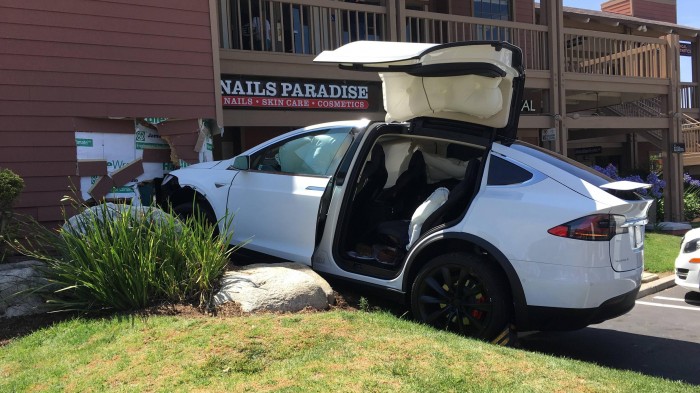Tesla Knows When a Crash Is Your Fault, and Other Carmakers Soon Will, Too
Everyone makes mistakes, and many people try to cover them up. But if you try to hide an error made behind the wheel of a car made by Tesla Motors, you are liable to be caught out. In fact, trying to hide what really happened in any kind of car accident could soon become just about impossible.
That’s the lesson of an incident over the weekend in which the owner of a Tesla Model X SUV crashed into a building and claimed it had suddenly accelerated on its own. But Tesla vehicles are constantly connected to their manufacturer via the Internet, and the company had this to say in a statement to the Verge:
"Data shows that the vehicle was traveling at 6 mph when the accelerator pedal was abruptly increased to 100 percent … Consistent with the driver’s actions, the vehicle applied torque and accelerated as instructed."

This kind of data-backed corrective is set to get more common. Most automakers don’t log data from their vehicles in the same way Tesla does, but the industry appears to be headed that way (see "Why Self-Driving Cars Must Be Programmed to Kill").
The majority of cars sold in the U.S. now have event data recorders—sometimes described as black boxes—that log data to be examined in the event of an accident.
Most of those devices don’t record as much detail as Tesla does, or send it out over the Internet. But Internet connectivity in cars is becoming more common, and carmakers are keen to make use of whatever data they can get from our vehicles.
Only about a quarter of new cars have the necessary technology today, but that's expected to reach over 90 percent by 2020. Companies such as GM are open about their interest in expanding the range of data they collect on driver actions to open up new business opportunities.
One big motivation for car companies is to get into the insurance business. Some insurance companies already offer discounts if you install a device in your car with sensors that monitor your driving habits, and GM has partnerships with several that tap into its OnStar system. But insurance companies could have much to gain by getting more detailed data as Tesla does, so they can see not only the car’s motion but every action of the driver.
Another reason for car companies to collect more data is to help their efforts to build autonomous cars. Tesla’s data collection is one reason it’s made such quick progress.
As with any kind of data collection, the logging of our every wheel twitch and gas pedal push won’t be universally welcomed. There will be many drivers, like the one in the recent Tesla incident, who feel they have been unfairly condemned by their driving logs. Those logs could also be used by carmakers or insurance companies in ways people find unsavory, for example to manipulate prices or promotions. Carmakers will also find themselves frequently being asked to help law enforcement with investigations.
But this data—and knowing that it’s being collected—should also make the roads safer. Multiple studies have shown that when police departments, taxi firms, or other companies add even crude black boxes to their vehicles, crash rates plummet.
(Read more: Electrek, The Verge, “10 Breakthrough Technologies: Tesla Autopilot”)
Keep Reading
Most Popular
Large language models can do jaw-dropping things. But nobody knows exactly why.
And that's a problem. Figuring it out is one of the biggest scientific puzzles of our time and a crucial step towards controlling more powerful future models.
How scientists traced a mysterious covid case back to six toilets
When wastewater surveillance turns into a hunt for a single infected individual, the ethics get tricky.
The problem with plug-in hybrids? Their drivers.
Plug-in hybrids are often sold as a transition to EVs, but new data from Europe shows we’re still underestimating the emissions they produce.
Google DeepMind’s new generative model makes Super Mario–like games from scratch
Genie learns how to control games by watching hours and hours of video. It could help train next-gen robots too.
Stay connected
Get the latest updates from
MIT Technology Review
Discover special offers, top stories, upcoming events, and more.